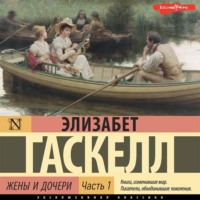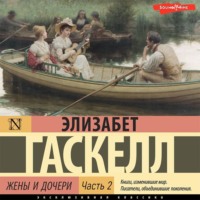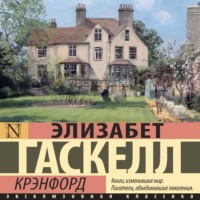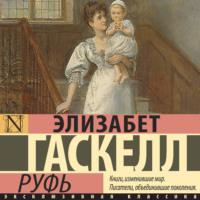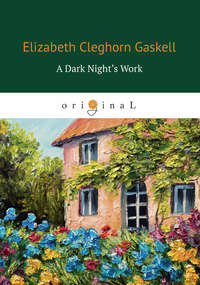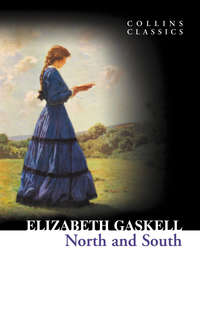
Полная версия
Mary Barton
So saying he ran off; and the two girls, without remark or discussion, turned homewards. They were overtaken by the elder Wilson, pale, grimy, and blear-eyed, but apparently as strong and well as ever. He loitered a minute or two alongside of them, giving an account of his detention in the mill; he then hastily wished good-night, saying he must go home and tell his missis he was all safe and well; but after he had gone a few steps, he turned back, came on Mary’s side of the pavement, and in an earnest whisper, which Margaret could not avoid hearing, he said –
‘Mary, if my boy comes across you to-night, give him a kind word or two for my sake. Do! bless you, there’s a good wench.’
Mary hung her head and answered not a word, and in an instant he was gone.
When they arrived at home, they found John Barton smoking his pipe, unwilling to question; yet very willing to hear all the details they could give him. Margaret went over the whole story, and it was amusing to watch his gradually increasing interest and excitement. First, the regular puffing abated, then ceased. Then the pipe was fairly taken out of his mouth, and held suspended. Then he rose, and at every further point he came a step nearer to the narrator.
When it was ended he swore (an unusual thing for him) that if Jem Wilson wanted Mary he should have her to-morrow, if he had not a penny to keep her.
Margaret laughed, but Mary, who was now recovered from her agitation, pouted and looked angry.
The work which they had left was resumed: but with full hearts fingers never go very quickly; and I am sorry to say that, owing to the fire, the two younger Miss Ogdens were in such grief for the loss of their excellent father, that they were unable to appear before the little circle of sympathising friends gathered together to comfort the widow, and see the funeral set off.
* ‘Nobbut’, none but, only. ‘No man sigh evere God no but the oon bigitun sone.’ – WICKLIFFE’S VERSION.
* ‘Nor’, generally used in Lancashire for ‘than’. ‘They had lever sleep nor be in laundery.’ – DUNBAR.
† ‘Shut’, quit.
* ‘Sin’, since. ‘Sin that his lord was twenty yere of age.’ – Prologue to Canterbury Tales.
* ‘Oud Church’; now the Cathedral of Manchester.
CHAPTER 6
Poverty and Death
‘How little can the rich man know
Of what the poor man feels,
When Want, like some dark demon foe,
Nearer and nearer steals!
He never tramp’d the weary round,
A stroke of work to gain,
And sicken’d at the dreaded sound
Telling him ’twas in vain.
Foot-sore, heart-sore, he never came
Back through the winter’s wind,
To a dank cellar, there no flame,
No light, no food, to find.
He never saw his darlings lie
Shivering, the grass their bed;
He never heard that maddening cry,
“Daddy, a bit of bread!”’
MANCHESTER SONG
John Barton was not far wrong in his idea that the Messrs Carson would not be over-much grieved for the consequences of the fire in their mill. They were well insured; the machinery lacked the improvements of late years, and worked but poorly in comparison with that which might now be procured. Above all, trade was very slack; cottons could find no market, and goods lay packed and piled in many a warehouse. The mills were merely worked to keep the machinery, human and metal, in some kind of order and readiness for better times. So this was an excellent opportunity, Messrs Carson thought, for refitting their factory with first-rate improvements, for which the insurance money would amply pay. They were in no hurry about the business, however. The weekly drain of wages given for labour, useless in the present state of the market, was stopped. The partners had more leisure than they had known for years; and promised wives and daughters all manner of pleasant excursions, as soon as the weather should become more genial. It was a pleasant thing to be able to lounge over breakfast with a review or newspaper in hand; to have time for becoming acquainted with agreeable and accomplished daughters, on whose education no money had been spared, but whose fathers, shut up during a long day with calicoes and accounts, had so seldom had leisure to enjoy their daughters’ talents. There were happy family evenings, now that the men of business had time for domestic enjoyments. There is another side to the picture. There were homes over which Carsons’ fire threw a deep, terrible gloom; the homes of those who would fain work, and no man gave unto them – the homes of those to whom leisure was a curse. There, the family music was hungry wails, when week after week passed by, and there was no work to be had, and consequently no wages to pay for the bread the children cried aloud for in their young impatience of suffering. There was no breakfast to lounge over; their lounge was taken in bed, to try and keep warmth in them that bitter March weather, and, by being quiet, to deaden the gnawing wolf within. Many a penny that would have gone little way enough in oatmeal or potatoes, bought opium to still the hungry little ones, and make them forget their uneasiness in heavy troubled sleep. It was mother’s mercy. The evil and the good of our nature came out strongly then. There were desperate fathers; there were bitter-tongued mothers (O God! what wonder!); there were reckless children; the very closest bonds of nature were snapt in that time of trial and distress. There was Faith such as the rich can never imagine on earth; there was ‘Love strong as death’; and self-denial, among rude, coarse men, akin to that of Sir Philip Sidney’s most glorious deed. The vices of the poor sometimes astound us here; but when the secrets of all hearts shall be made known, their virtues will astound us in far greater degree. Of this I am certain.
As the cold, bleak spring came on (spring, in name alone), and consequently as trade continued dead, other mills shortened hours, turned off hands, and finally stopped work altogether.
Barton worked short hours; Wilson, of course, being a hand in Carsons’ factory, had no work at all. But his son, working at an engineer’s, and a steady man, obtained wages enough to maintain all the family in a careful way. Still it preyed on Wilson’s mind to be so long indebted to his son. He was out of spirits, and depressed. Barton was morose, and soured towards mankind as a body, and the rich in particular. One evening, when the clear light at six o’clock contrasted strangely with the Christmas cold, and when the bitter wind piped down every entry, and through every cranny, Barton sat brooding over his stinted fire, and listening for Mary’s step, in unacknowledged trust that her presence would cheer him. The door was opened, and Wilson came breathless in.
‘You’ve not got a bit o’ money by you, Barton?’ asked he.
‘Not I; who has now, I’d like to know? Whatten you want it for?’
‘I donnot* want it for mysel’, tho’ we’ve none to spare. But don ye know Ben Davenport as worked at Carsons’? He’s down wi’ the fever, and ne’er a stick o’ fire nor a cowd† potato in the house.’
‘I han got no money, I tell ye,’ said Barton. Wilson looked disappointed. Barton tried not to be interested, but he could not help it in spite of his gruffness. He rose, and went to the cupboard (his wife’s pride long ago). There lay the remains of his dinner, hastily put by ready for supper. Bread, and a slice of cold fat boiled bacon. He wrapped them in his handkerchief, put them in the crown of his hat, and said – ‘Come, let us be going.’
‘Going – art thou going to work this time o’ day?’
‘No, stupid, to be sure not. Going to see the chap thou spoke on.’ So they put on their hats and set out. On the way Wilson said Davenport was a good fellow, though too much of the Methodee; that his children were too young to work, but not too young to be cold and hungry; that they had sunk lower and lower, and pawned thing after thing, and that they now lived in a cellar in Berry Street, off Store Street. Barton growled inarticulate words of no benevolent import to a large class of mankind, and so they went along till they arrived in Berry Street. It was unpaved; and down the middle a gutter forced its way, every now and then forming pools in the holes with which the street abounded. Never was the old Edinburgh cry of Gardez l’eau! more necessary than in this street. As they passed, women from their doors tossed household slops of every description into the gutter; they ran into the next pool, which overflowed and stagnated. Heaps of ashes were the stepping-stones, on which the passer-by, who cared in the least for cleanliness, took care not to put his foot. Our friends were not dainty, but even they picked their way, till they got to some steps leading down to a small area, where a person standing would have his head about one foot below the level of the street, and might at the same time, without the least motion of his body, touch the window of the cellar and the damp muddy wall right opposite. You went down one step even from the foul area into the cellar in which a family of human beings lived. It was very dark inside. The windowpanes, many of them, were broken and stuffed with rags, which was reason enough for the dusky light that pervaded the place even at mid-day. After the account I have given of the state of the street, no one can be surprised that on going into the cellar inhabited by Davenport, the smell was so fœtid as almost to knock the two men down. Quickly recovering themselves, as those inured to such things do, they began to penetrate the thick darkness of the place, and to see three or four little children rolling on the damp, nay wet brick floor, through which the stagnant, filthy moisture of the street oozed up; the fire-place was empty and black; the wife sat on her husband’s lair, and cried in the dark loneliness.
‘See, missis, I’m back again. – Hold your noise, children, and don’t mither* your mammy for bread; here’s a chap as has got some for you.’
In that dim light, which was darkness to strangers, they clustered round Barton, and tore from him the food he had brought with him. It was a large hunch of bread, but it vanished in an instant.
‘We mun do summut for ’em,’ said he to Wilson. ‘You stop here, and I’ll be back in half-an-hour.’
So he strode, and ran, and hurried home. He emptied into the ever-useful pocket-handkerchief the little meal remaining in the mug. Mary would have her tea at Miss Simmonds’; her food for the day was safe. Then he went upstairs for his better coat, and his one gay red-and-yellow silk pocket-handkerchief – his jewels, his plate, his valuables, these were. He went to the pawn-shop; he pawned them for five shillings: he stopped not, nor stayed, till he was once more in London Road, within five minutes’ walk of Berry Street – then he loitered in his gait, in order to discover the shops he wanted. He bought meat, and a loaf of bread, candles, chips, and from a little retail yard he purchased a couple of hundredweights of coal. Some money still remained – all destined for them, but he did not yet know how best to spend it. Food, light, and warmth, he had instantly seen were necessary; for luxuries he would wait. Wilson’s eyes filled with tears when he saw Barton enter with his purchases. He understood it all, and longed to be once more in work that he might help in some of these material ways, without feeling that he was using his son’s money. But though ‘silver and gold he had none’, he gave heart-service and love-works of far more value. Nor was John Barton behind in these. ‘The fever’ was (as it usually is in Manchester) of a low, putrid, typhoid kind; brought on by miserable living, filthy neighbourhood, and great depression of mind and body. It is virulent, malignant, and highly infectious. But the poor are fatalists with regard to infection; and well for them it is so, for in their crowded dwellings no invalid can be isolated. Wilson asked Barton if he thought he should catch it, and was laughed at for his idea.
The two men, rough, tender nurses as they were, lighted the fire, which smoked and puffed into the room as if it did not know the way up the damp, unused chimney. The very smoke seemed purifying and healthy in the thick clammy air. The children clamoured again for bread; but this time Barton took a piece first to the poor, helpless, hopeless woman, who still sat by the side of her husband, listening to his anxious miserable mutterings. She took the bread, when it was put into her hand, and broke a bit, but could not eat. She was past hunger. She fell down on the floor with a heavy unresisting bang. The men looked puzzled. ‘She’s well-nigh clemmed,’ said Barton. ‘Folk do say one mustn’t give clemmed people much to eat; but, bless us, she’ll eat nought.’
‘I’ll tell yo what I’ll do,’ said Wilson. ‘I’ll take these two big lads, as does nought but fight, home to my missis for to-night, and I’ll get a jug o’ tea. Them women always does best with tea, and such-like slop.’
So Barton was now left alone with a little child, crying (when it had done eating) for mammy; with a fainting, dead-like woman; and with the sick man, whose mutterings were rising up to screams and shrieks of agonised anxiety. He carried the woman to the fire, and chafed her hands. He looked around for something to raise her head. There was literally nothing but some loose bricks. However, those he got; and taking off his coat he covered them with it as well as he could. He pulled her feet to the fire, which now began to emit some faint heat. He looked round for water, but the poor woman had been too weak to drag herself out to the distant pump, and water there was none. He snatched the child, and ran up the area-steps to the room above, and borrowed their only saucepan with some water in it. Then he began, with the useful skill of a working man, to make some gruel; and when it was hastily made, he seized a battered iron table-spoon (kept when many other little things had been sold in a lot), in order to feed baby, and with it he forced one or two drops between her clenched teeth. The mouth opened mechanically to receive more, and gradually she revived. She sat up and looked round; and recollecting all, fell down again in weak and passive despair. Her little child crawled to her, and wiped with its fingers the thick-coming tears which she now had strength to weep. It was now high time to attend to the man. He lay on straw, so damp and mouldy, no dog would have chosen it in preference to flags: over it was a piece of sacking, coming next to his worn skeleton of a body; above him was mustered every article of clothing that could be spared by mother or children this bitter weather; and in addition to his own, these might have given as much warmth as one blanket, could they have been kept on him; but, as he restlessly tossed to and fro, they fell off and left him shivering in spite of the burning heat of his skin. Every now and then he started up in his naked madness, looking like the prophet of woe in the fearful plague-picture; but he soon fell again in exhaustion, and Barton found he must be closely watched, lest in these falls he should injure himself against the hard brick floor. He was thankful when Wilson reappeared, carrying in both hands a jug of steaming tea, intended for the poor wife; but when the delirious husband saw drink, he snatched at it with animal instinct, with a selfishness he had never shown in health.
Then the two men consulted together. It seemed decided, without a word being spoken on the subject, that both should spend the night with the forlorn couple; that was settled. But could no doctor be had? In all probability, no; the next day an Infirmary order must be begged, but meanwhile the only medical advice they could have must be from a druggist’s. So Barton (being the moneyed man) set out to find a shop in London Road.
It is a pretty sight to walk through a street with lighted shops; the gas is so brilliant, the display of goods so much more vividly shown than by day, and of all shops a druggist’s looks the most like the tales of our childhood, from Aladdin’s garden of enchanted fruits to the charming Rosamond with her purple jar. No such associations had Barton; yet he felt the contrast between the well-filled, well-lighted shops and the dim gloomy cellar, and it made him moody that such contrasts should exist. They are the mysterious problem of life to more than him. He wondered if any in all the hurrying crowd had come from such a house of mourning. He thought they all looked joyous, and he was angry with them. But he could not, you cannot, read the lot of those who daily pass you by in the street. How do you know the wild romances of their lives; the trials, the temptations they are even now enduring, resisting, sinking under? You may be elbowed one instant by the girl desperate in her abandonment, laughing in mad merriment with her outward gesture, while her soul is longing for the rest of the dead, and bringing itself to think of the cold-flowing river as the only mercy of God remaining to her here. You may pass the criminal, meditating crimes at which you will to-morrow shudder with horror as you read them. You may push against one, humble and unnoticed, the last upon earth, who in heaven will for ever be in the immediate light of God’s countenance. Errands of mercy – errands of sin – did you ever think where all the thousands of people you daily meet are bound? Barton’s was an errand of mercy; but the thoughts of his heart were touched by sin, by bitter hatred of the happy, whom he, for the time, confounded with the selfish.
He reached a druggist’s shop and entered. The druggist (whose smooth manners seemed to have been salved over with his own spermaceti) listened attentively to Barton’s description of Davenport’s illness; concluded it was typhus fever, very prevalent in that neighbourhood; and proceeded to make up a bottle of medicine, sweet spirits of nitre, or some such innocent potion, very good for slight colds, but utterly powerless to stop, for an instant, the raging fever of the poor man it was intended to relieve. He recommended the same course they had previously determined to adopt, applying the next morning for an Infirmary order; and Barton left the shop with comfortable faith in the physic given him; for men of his class, if they believe in physic at all, believe that every description is equally efficacious.
Meanwhile, Wilson had done what he could at Davenport’s home. He had soothed, and covered the man many a time; he had fed and hushed the little child, and spoken tenderly to the woman, who lay still in her weakness and her weariness. He had opened a door, but only for an instant; it led into a back cellar, with a grating instead of a window, down which dropped the moisture from pigsties, and worse abominations. It was not paved; the floor was one mass of bad smelling mud. It had never been used, for there was not an article of furniture in it; nor could a human being, much less a pig, have lived there many days. Yet the ‘back apartment’ made a difference in the rent. The Davenports paid threepence more for having two rooms. When he turned round again, he saw the woman suckling the child from her dry, withered breast.
‘Surely the lad is weaned!’ exclaimed he, in surprise. ‘Why, how old is he?’
‘Going on two year,’ she faintly answered. ‘But, oh! it keeps him quiet when I’ve nought else to gi’ him, and he’ll get a bit of sleep lying there, if he’s getten nought beside. We han done our best to gi’ the childer* food, howe’er we pinch ourselves.’
‘Han† ye had no money fra’ th’ town?’
‘No; my master is Buckinghamshire born; and he’s feared the town would send him back to his parish, if he went to th’ board; so we’ve just borne on in hope o’ better times. But I think they’ll never come in my day,’ and the poor woman began her weak high-pitched cry again.
‘Here, sup‡ this drop o’ gruel, and then try and get a bit o’ sleep. John and I will watch by your master to-night.’
‘God’s blessing be on you.’
She finished the gruel, and fell into a deep sleep. Wilson covered her with his coat as well as he could, and tried to move lightly for fear of disturbing her; but there need have been no such dread, for her sleep was profound and heavy with exhaustion. Once only she roused to pull the coat round her little child.
And now Wilson’s care, and Barton’s to boot, was wanted to restrain the wild mad agony of the fevered man. He started up, he yelled, he seemed infuriated by overwhelming anxiety. He cursed and swore, which surprised Wilson, who knew his piety in health, and who did not know the unbridled tongue of delirium. At length he seemed exhausted, and fell asleep; and Barton and Wilson drew near the fire, and talked together in whispers. They sat on the floor, for chairs there were none; the sole table was an old tub turned upside down. They put out the candle and conversed by the flickering fire-light.
‘Han yo known this chap long?’ asked Barton.
‘Better nor three year. He’s worked wi’ Carsons that long, and were always a steady, civil-spoken fellow, though, as I said afore, somewhat of a Methodee. I wish I’d getten a letter he’d sent his missis, a week or two agone, when he were on tramp for work. It did my heart good to read it; for, yo see, I were a bit grumbling myself; it seemed hard to be sponging on Jem, and taking a’ his flesh-meat money to buy bread for me and them as I ought to be keeping. But, yo know, though I can earn nought, I mun eat summut. Well, as I telled ye, I were grumbling, when she (indicating the sleeping woman by a nod) brought me Ben’s letter, for she could na’ read hersel. It were as good as Bible-words; ne’er a word o’ repining; a’ about God being our Father, and that we mun bear patiently whate’er He sends.’
‘Don ye think He’s th’ masters’ Father, too? I’d be loth to have ’em for brothers.’
‘Eh, John! donna talk so; sure there’s many and many a master as good or better nor us.’
‘If you think so, tell me this. How comes it they’re rich, and we’re poor? I’d like to know that. Han they done as they’d be done by for us?’
But Wilson was no arguer; no speechifier, as he would have called it. So Barton, seeing he was likely to have it his own way, went on.
‘You’ll say (at least many a one does), they’n* getten capital an’ we’n getten none. I say, our labour’s our capital, and we ought to draw interest on that. They get interest on their capital somehow a’ this time, while ourn is lying idle, else how could they all live as they do? Besides there’s many on ’em has had nought to begin wi’; there’s Carsons, and Duncombes, and Mengies, and many another, as comed into Manchester with clothes to their back, and that were all, and now they’re worth their tens of thousands, a’ getten out of our labour; why, the very land as fetched but sixty pound twenty year agone is now worth six hundred, and that, too, is owing to our labour; but look at yo, and see me, and poor Davenport yonder; whatten better are we? They’n screwed us down to th’ lowest peg, in order to make their great big fortunes, and build their great big houses, and we, why we’re just clemming, many and many of us. Can you say there’s nought wrong in this?’
‘Well, Barton, I’ll not gainsay ye. But Mr Carson spoke to me after th’ fire, and says he, “I shall ha’ to retrench, and be very careful in my expenditure during these bad times, I assure ye”; so yo see th’ masters suffer too.’
‘Han they ever seen a child o’ their’n die for want o’ food?’ asked Barton, in a low deep voice.
‘I donnot mean,’ continued he, ‘to say as I’m so badly off. I’d scorn to speak for myself; but when I see such men as Davenport there dying away, for very clemming, I cannot stand it. I’ve but gotten Mary, and she keeps herself pretty much. I think we’ll ha’ to give up housekeeping; but that I donnot mind.’
And in this kind of talk the night, the long heavy night of watching, wore away. As far as they could judge, Davenport continued in the same state, although the symptoms varied occasionally. The wife slept on, only roused by the cry of her child now and then, which seemed to have power over her, when far louder noises failed to disturb her. The watchers agreed, that as soon as it was likely Mr Carson would be up and visible, Wilson should go to his house, and beg for an Infirmary order. At length the grey dawn penetrated even into the dark cellar; Davenport slept, and Barton was to remain there until Wilson’s return; so, stepping out into the fresh air, brisk and reviving, even in that street of abominations, Wilson took his way to Mr Carson’s.



